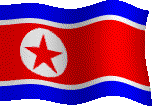



Day 8: The Yalu Bridge Leads To The Future
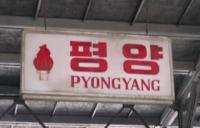
Pyongyang Station
|
|
|
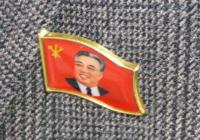
Everyone wears this in North Korea
|
|
|
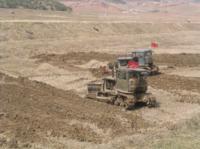
Red Flag tractors?
|
|
|
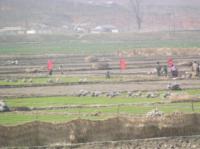
Socialist commune?
|
|
|
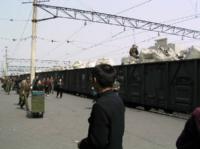
Look out for the men on the train. Shortly after this, the police
ordered me to stop taking pictures.
|
|
|
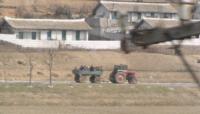
Tractors as public transport in the countryside
|
|
|
Day of farewell. At the Pyongyang Train Station, Mr Roh and Ms Park sent us off. After confirming for the last time that we could not get hold of their Great Leader badges (for they were specially issued to individuals by the state and properly accounted for), Mr Roh became our model of the day. All of us zoomed in on the tiny badge with our cameras.
Onto the Chinese carriages, tagged onto a North Korean locomotive and meant-for-locals carriages that were barred to us, plus a few Russian carriages from Vladivostok. The train limped through the wretched-looking countryside, taking 5 hours to cover 120km. We passed farmers ploughed the fields with oxen, red flags flapping in the wind, towns of rusty factories and unpainted concrete, and railway stations whose only hint of colour were the portraits of the two leaders.
We must have passed through the small town of Ryongchon, where a train accident a few days later led to a major disaster which killed untold hundreds. I have no idea exactly which stop it was but it could well be the one where I was stopped from snapping a picture for the first time on this journey.
A cargo train full of coal and timber was travelling parallel to our stationary train, with people holding on tight to the rooftop of the carriages, not unlike a typical railway scene in India and Bangladesh. I clicked away with my camera, but a soldier on the station platform shouted, strangely, in Russian, “Nyet, foto!” A Chinese passenger standing near shouted in Chinese, “Ta suo bu ke pai zao!” “He says, no photo!”
I kept my camera. Fortunately, nothing more happened. The soldier didn’t jump onto the train for an arrest, which could well be the case five years ago. The country is changing, though hardly fast enough.
 A large city soon came into sight. This was Sinuiju, the capital of North Phyongan Province which lies on Yalu river facing the Chinese city of Dandong. This was also the site of the Sinuiju Special Economic Zone, which failed to take off after the Chinese arrested the dodgy Dutch-Chinese tycoon, Yang Bin.
A large city soon came into sight. This was Sinuiju, the capital of North Phyongan Province which lies on Yalu river facing the Chinese city of Dandong. This was also the site of the Sinuiju Special Economic Zone, which failed to take off after the Chinese arrested the dodgy Dutch-Chinese tycoon, Yang Bin.
Yang Bin was appointed by Kim Jong Il to be the Chief Executive of what was supposed to become the North Korean equivalent of Shenzhen (the booming Chinese city on the border with Hong Kong). The Chinese had accused Yang Bin of dodging taxes, although some observers said the move was taken to punish Kim Jong Il for disobedience to his Chinese overlords, while some suspected that it was a favour granted to the Americans who were anxious to see Kim Jong Il’s experiment fail.
Sinuiju has long been exposed to the rapid economic reforms of China. Chinese businessmen and day tourists come here often, leaving capitalist influences dreaded and rejected in the rest of North Korea. As the train rolled across the city’s tracks, casual glances revealed many small shops, kiosks and hawkers which might indicate the budding emergence of private enterprise in this country.
Even then, this was a pathetically run-down city, whose only saving grace was the gigantic statue of Kim Il Sung, with arms pointing south towards Pyongyang. We endured an incredible three hours of passport examination and customs at the railway station. Here, we dealt with a few rather rude, stiff-looking customs officials, who were the only fat people we had seen on the trip, that is, not counting the portraits of our two best friends that we saw everywhere in this country. Obviously, we have learned who made the most money in North Korea.
The train moved again, and there it is, the splendid Yalu River that divides China and North Korea. On the North Korean side are the decaying, rundown facades and high-rise slums of the Stalinist state. On the Chinese side, nothing but the skylines of Dandong’s dazzling glass towers and massive shopping malls and hotels, all-recent monuments and evidence of China’s new commercialism and economic superpower status in Asia.
|
|
|
|
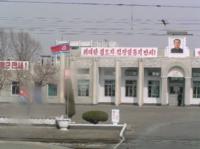
A DPRK town along the railway
|
|
|
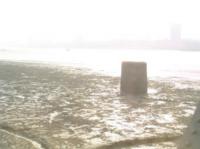
The destroyed bridge on the North Korean side
|
|
|
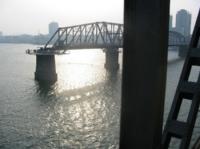
The intact Chinese bridge and the skyscrapers and shopping malls of Dandong
|
|
|
Dandong may be among the poorest of China’s medium-sized cities but compared to any of North Korea’s cities including Pyongyang, it is the brave new world, a first worldish place next to a miserable wreck of propaganda and lies. Even the Chinese customs service we would encounter later, communist by name, was polite and efficient, and had the entry cards filled for us.
The kilometre-wide Sino-Korean Friendship Bridge was a link between two economic systems. We saw the stumps of the old Yalu Bridge on the North Korean side of the river, mere remnants of the bridge destroyed by American bombers in 1950, as well as the standing intact “half-bridge” over the Chinese half of the river.
Given the entrenched rule of the Kim’s in DPRK, it is inconceivable that the country will be ruled by anyone other than him, at least in the next decade or so. However, the country is bankrupt, starved of support from old allies.
Kim Jong Il, for all the misadventures, is not a frog in the well. In fact, former US Secretary of State Madeleine Albright, who has met Mr Kim, said that he was rational, very well informed and "was not delusional".
The winds of capitalism and market economics have triumphed everywhere. Kim Jong Il had seen what happened in China and elsewhere, and there are signs that reforms are gradually undertaken to save the regime. Whilst this is unlikely to lead to a new democratic North Korea in the short term, my bet is that Kim Jong Il would adopt the Chinese model of gradual economic reforms coupled with existing iron-armed rule.
Kim Jong Il’s private kingdom, funded by a mixture of nuclear extortions and perhaps South Korean and Chinese investments in the coming years, could harness the nation’s low-cost but highly educated workforce to turn itself into one of the largest chaebols of all Korea’s.
Ultimately, Kim Jong Il might consider tweaking the stretched arm of his father’s statue, either northwards to Dandong, or slightly to the southeast, towards that state they currently denounced as the “American puppet government in Seoul”. Perhaps then will North Korea be on track to become a worker’s paradise.
THE END
Buy these books!
|
Copyright - Tan Wee Cheng, Singapore, 2004
|







 A large city soon came into sight. This was Sinuiju, the capital of North Phyongan Province which lies on Yalu river facing the Chinese city of Dandong. This was also the site of the Sinuiju Special Economic Zone, which failed to take off after the Chinese arrested the dodgy Dutch-Chinese tycoon, Yang Bin.
A large city soon came into sight. This was Sinuiju, the capital of North Phyongan Province which lies on Yalu river facing the Chinese city of Dandong. This was also the site of the Sinuiju Special Economic Zone, which failed to take off after the Chinese arrested the dodgy Dutch-Chinese tycoon, Yang Bin.